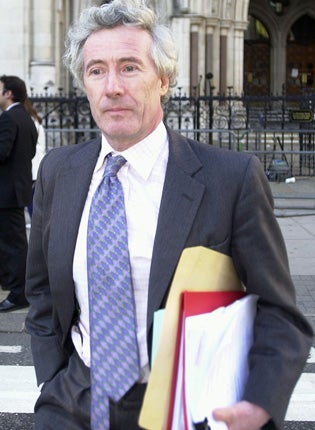Miliband attacks judges over torture ruling

Your support helps us to tell the story
From reproductive rights to climate change to Big Tech, The Independent is on the ground when the story is developing. Whether it's investigating the financials of Elon Musk's pro-Trump PAC or producing our latest documentary, 'The A Word', which shines a light on the American women fighting for reproductive rights, we know how important it is to parse out the facts from the messaging.
At such a critical moment in US history, we need reporters on the ground. Your donation allows us to keep sending journalists to speak to both sides of the story.
The Independent is trusted by Americans across the entire political spectrum. And unlike many other quality news outlets, we choose not to lock Americans out of our reporting and analysis with paywalls. We believe quality journalism should be available to everyone, paid for by those who can afford it.
Your support makes all the difference.The Government has launched a damaging attack on the judiciary in its increasingly desperate legal battle to stop the public from seeing evidence of Britain's involvement in torture.
Lawyers acting for the Foreign Secretary, David Miliband, yesterday accused two High Court judges of acting "irresponsibly" when they delivered a ruling in favour of disclosure of sensitive material relating to the alleged torture of Binyam Mohamed, a British resident, by US agents.
The case, which is supported by media groups including The Independent, has been lost by the Government in the High Court but ministers have repeatedly tried to overturn the decision. Yesterday the Government dramatically raised the stakes when its barrister, Jonathan Sumption QC, told the Court of Appeal that the judges' stance was "both, in many respects, unnecessary and profoundly damaging to the interests of this country. I would go so far as to say their views were irresponsible."
Earlier this year Lord Justice Thomas and Mr Justice Lloyd Jones said they wanted to release a seven-paragraph summary of what Washington had told London about Mr Mohamed's treatment. They said this summary was critical to the former detainee's case against the British and US governments. But Mr Miliband has said that the summary would "seriously damage national security" by compromising the sharing of intelligence between the two governments.
Mr Sumption said: "The court is not a roving commission of inquiry into everything of public interest that may incidentally arise in the course of proceedings." He added: "The court is not a branch of the media. It is not a pressure group." It was also not "an organ of the UK".
The QC continued: "I do not dispute that there is a public interest in the exposure of wrong-doing and in informed public debate and in free speech, but they are not interests which have anything to do with the particular issues in this case."
Human rights lawyers and MPs said the criticism of the judges distracted from the central issues in the case – Britain's alleged conspiracy in torture.
The Liberal Democrats' foreign affairs spokesman, Ed Davey, said: "The Foreign Secretary does not seem to realise that his own opposition to transparency on torture is damaging Britain far more than these judges. The political debate on torture in the US has changed with President Obama. While the judges recognise this, David Miliband has chosen to ignore it." The case continues.
Best money can buy: Miliband's QC
*Jonathan Sumption QC, 60, is a member of an elite club of lawyers whose specialist services command annual fees of more than £1m. After an education at Eton and Magdalen College, Oxford, the high-flying barrister built a successful career at the Bar by dissecting complex commercial disputes.
His reputation for being able to turn difficult cases also brought him to the attention of ministers defending controversial positions and in 2003 he was instructed to represent the Government at Lord Hutton's inquiry into the death of the weapons inspector Dr David Kelly.
But his success and ambition have not been without controversy. Reports that Mr Sumption had this year applied for a job as a Justice in the Supreme Court ruffled some judicial feathers. Traditionally, the route to the top tribunal has been one of advancement through the lower courts and Mr Sumption's candidature led to accusations that he was attempting to leapfrog more experienced, but less gifted colleagues. He has subsequently withdrawn his application.
Join our commenting forum
Join thought-provoking conversations, follow other Independent readers and see their replies
Comments